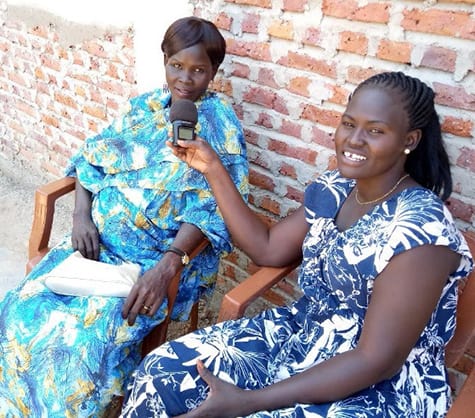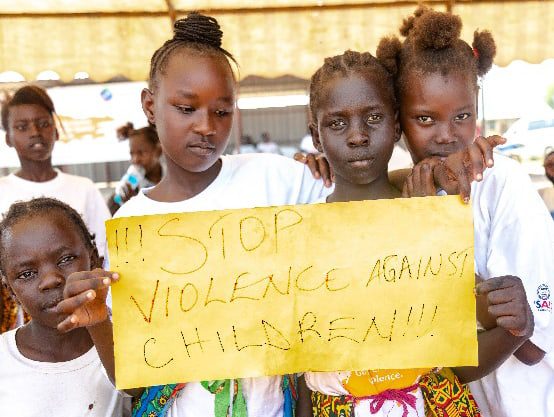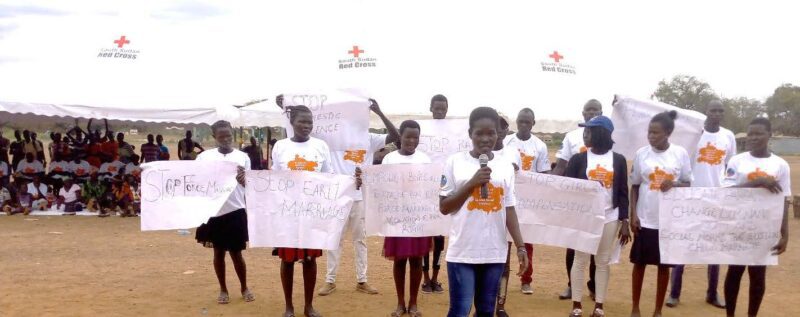Listeners of South Sudan’s community radio stations heard many stories of violence against women and girls and how to address it during the 16 Days of Activism Campaign against Gender-Based Violence (GBV) held from November 25 – December 10, 2019.
Internews collaborated with numerous local partners to bring radio content to the airwaves and stimulate discussions about gender-based violence and the protection of women and girls.
Internews partner Eye Radio in Juba interviewed the USAID Mission Director who said the agency has established a hotline number that can be used to report incidents of GBV in projects that are funded by USAID. The Director, Leslie Reed, said, “We do not want to see our partners victimizing people in South Sudan.”
Eye Radio’s Peace of Her Mind program interviewed Esther Akumu Achire, the director general for gender equity and inclusive education at the Ministry of Education, who said that men and women must work together. Without women, she said there will never be development or peace in South Sudan: “I urge men to take care and make sure they end gender-based violence against women and take themselves to be as equal.”
Other Eye Radio programs expanded the coverage. Under the Tree featured a member of civil society, Neno Diana, who called on the government to enact policies to punish perpetrators of GBV to reduce the instances of GBV. She also called on parents to counteract traditional gender norms and treat girls and boys equally.
The Dawn Show interviewed the Minister of Gender and Social Welfare, Jemma Nunu Kumba, who said the government will put in place progressive policies for addressing the barriers to provision of GBV prevention and will fully operationalize a specialized court to try GBV cases by 2021.
Mayardit FM, a community radio station in Turalei and part of The Radio Community (TRC), a network of stations supported by Internews and now operating as an independent NGO, aired a program where citizens proposed active awareness against gender-based violence in South Sudan. Some of the listeners who phoned in during the discussion said there is a need to involve local leaders in the communities through sensitization. They said this would help end physical and psychological abuse on girls and women.
Some of the listeners calling in said several cases of rape have recently occurred in the community and were not reported because of the stigma it could cause to the survivors. A female caller asked about how to handle a case where a woman in relationship is raped. She cited cultural norms as a barrier and added that this instills fear and embarrassment in girls.
In addition, the station covered a story about forced marriage in Twic state. The administration of a church and a secondary school said that six girls were forced into marriage this year. Among these girls were two senior students who were abducted from the school compound by men in uniform. The church and school condemned the abduction. Members of parliament and the elders of the community urged the government to apprehend the suspects.

Abyei Information & Radio Service (AIRS), an Internews partner in Agok, produced a story about an attempted rape of a young girl in Abyei. The girl’s mother said the perpetrator was her lover with whom she had lived for a long time. She was outraged by her partner’s behavior and decided to end the relationship immediately. The Advisor to Abyei Chief Administrator on Gender and Child Affairs, Aluel Manyiel Rou, condemned the act saying rape is a form of gender-based violence that needs to be fought against in the community. She encouraged gender-based violence survivors to speak out and called on women to unite and find ways to fight rape.
“Raping women, raping girls, raping children. We condemn it as something very bad and it should not be happening in our community.”
– Advisor to Abyei Chief Administrator on Gender and Child Affairs
“It’s good to let the community know that such kind of things are happening,” said a listener who called in to the show.
In total, Internews and its partners across South Sudan produced over 65 original radio programs; 29% of this content was at least partially produced and edited by women.
Off-air Events
Internews partnered with Resilience Organization (RO), a South Sudanese female-led NGO, to cover community events related to the 16 Days.

In Juba, an event in Gumbo Shirikat attracted more than 400 people to watch local youth raising awareness about the harmful effects of GBV by performing two plays about early marriage and domestic violence.
In Torit, RO worked with different sectors of the community including women’s groups and groups of persons with disabilities. The general public was invited to attend the community event at Freedom Square. Students from the primary and secondary schools performed dramas, skits and poetry addressing elements of GBV. Song and dance performances included GBV prevention messaging from cultural groups in native languages including Acholi, Lotuho and others.
RO also worked with Radio Emmanuel in Torit to produce and broadcast radio programs ahead of the event. Interviews were held with women’s groups, community mobilizers, youth groups and volunteers. Kevine Abalo, the founder of RO, said in her closing remarks that the fight against GBV is an inclusive effort, which needs both men and women to agitate for change. During a Q&A session, participants asked questions about the different types of GBV and applauded the event for being aimed at the community.
Journalism Trainings
Internews’ Global Health Media Adviser, Ida Jooste, conducted a Gender and Health Masterclass in Juba for practicing journalists from around the country. The masterclass brought together 20 journalists, including nine women, to learn more about covering gender and health issues, including GBV. The masterclass also included a component for health and gender NGO partners, who were trained on how to engage journalists and create appealing story ideas about their work. The final day included a mock press conference where partners fielded questions from journalists.
In addition, two journalism trainings on how to report ethically and professionally about GBV were held in Torit and Juba. The workshops involved 34 trained journalists who learned about the different types of GBV, how to report on it and how to conduct interviews that are sensitive to GBV survivors. In Juba, the training was led by Internews subgrantee, AMDISS/Media Development Institute (MDI).
In Torit, the training was led by the Internews Senior Media Adviser. The training is part of Internews’ renewed commitment to support the production and broadcast of higher quality content about women and girls, and GBV specifically. The training helped journalists in Torit understand and appreciate ethical standards in covering stories on GBV. In addition, the journalists were encouraged to think more about creative, innovative stories to address GBV.
Internews’ work in South Sudan is supported by USAID.
(Banner photo: Secondary school students present a poem on GBV at Freedom Square in Torit during a community event organized by Resilience Organization. Photo: Internews)
